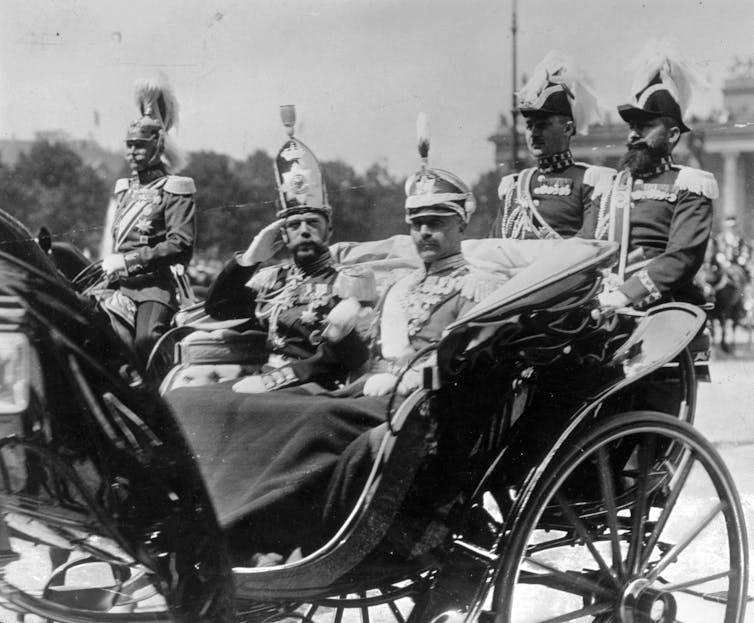Russia's imperial mindset dates back centuries – and it is here to stay
Postcolonial scholarship has overwhelmingly focused on the legacy of Western empires – but despite a long history of foreign expansionism and domination, Russia, in its various incarnations, has never received the same amount of critical scrutiny. The Tsarist empire’s position outside the West proper, the Soviet Union’s stated opposition to imperialism, and the fact that Russia’s empire was a contiguous land empire rather than an overseas one all helped shield it from postcolonial critique.
The result is a strange oversight – especially considering the fact that the heir to the largest continental empire in modern history clearly remains uncomfortable with the independence of many of its former subordinates.
That discomfort stems from an imperial mindset that has survived the 20th century’s revolutions and geopolitical transformations, and which remains fundamentally entwined with Russia’s complex and longstanding sense of its place in the world.
Neither fully European nor fully Asian but instead splayed over the Eurasian landmass, Russia has always struggled with its ambiguous identity. Pre-modern Russia was Christian, but Orthodox; in the 19th century, its intellectual elites engaged in Europe’s great enlightenment debates, while its autocratic government and feudal-agrarian economy increasingly set it apart from a liberalising, industrialising Europe. Similarly, the Bolsheviks’ Marxism-Leninism was simultaneously a product of the European enlightenment and a clear ideological break from Euro-American capitalism.
The upshot is that for centuries, Russia’s multifaceted, complex identity has led it to justify its imperial dominion in its own peculiar way, over subjects both Eastern and Western. Like its Western counterparts, Russia pursued distinct civilising missions that it imposed – by force if necessary – on subject peoples in a centuries-old pattern that has continued into the present. But unlike the Western powers, it did so by arrogating itself “spheres of influence” situated in both East and West.

Depending on when and where they were undertaken, these civilising ventures were enforced in different ways. In “its” East – the Caucasus and Central Asia – imperial Russia styled itself a protector of Christianity, or an “enlightening force” much in the same way as Western powers, using identifiably Orientalist tropes against Muslim “backwardness” and Eastern “irrationality”. In the West, conversely, Russia posed as a guarantor of Orthodoxy against the corrupting dangers of Catholic “Jesuitism”, or the more liberal expressions of the European enlightenment.
Soviet Russia invoked Marxism-Leninism to justify a similar onslaught, this time against “bourgeois nationalisms” – first in areas like Ukraine, and after World War Two, in Eastern and Central Europe. This it managed to do while also framing a campaign against Islamic traditions as a secular struggle against oriental backwardness.
Today, in an age where formal empire is considered anathema, this Eastern/Western ambiguity still shapes Russia’s attitude towards “its” neighbourhood. It means the Kremlin can argue that its western “dominions” are in fact separate from the West proper, while simultaneously justifying its lordship over “irrational orientals”.
Russia to the rescue
To distinguish itself from the liberal West, the Putin government elevates and glorifies traditional elements of Russian identity, among them Orthodox Christianity and carefully selected aspects of the Soviet legacy – chief among them the “Great Patriotic War”, the Russian term for the fight against Nazi Germany on the Eastern Front.
By invoking this history, Putin’s Russia lays claim to an “authentic”, traditional European identity. The West, so the argument goes, has degenerated into postmodern decadence, and only Russia is able to salvage Europe’s conservatively defined values before they fall victim to what Putin has called “chaotic darkness”.
On another front, Russia defines itself as a civilising force over Caucasian and Central Asian “Orientals”, whom it presents as irrational and prone to misrule. Accordingly, the “authenticity” of Western and Eastern nations and peoples is defined on distinctly Russian terms.
The “good”, “authentic” Ukrainian is by definition pro-Russian, and so is the “authentic” Chechen or Georgian. Those in the “Russian” East who do not conform are branded as madmen and Islamist terrorists; in “its” West, they are fascists or moral degenerates.
Non-Russian Ukraine is apparently the most deviant, with the Kremlin frequently making largely unfounded accusations that Kiev is under the sway of neo-Nazis. The Russian government’s descriptions of its Eastern opponents are no less flattering, harking back to Tsarist and early Soviet times. Adversaries such as Georgia’s Mikhail Saakashvili or Chechnya’s Dzhokhar Dudayev are “madmen”, “brigands” and “bandits”; meanwhile, back in Russia itself, ordinary “individuals of Caucasian (or Central Asian) nationality” are routinely confronted with that ultimate indicator of imperial hierarchy: racism.
This is about more than just “Putinism”. It is a pattern that’s repeated itself for centuries, and it stems from a deeply held aspiration to “great power” status. The Tsarist Empire did it, so did the Soviet Union, and so does today’s Russian Federation. “Decolonising” the Kremlin might therefore take much longer, and much more, than overthrowing the Tsar, dismantling the Soviet Union, or securing some kind of “regime change” in today’s Moscow. It will require nothing less than a fundamental redefinition of Russian identity.
Kevork Oskanian, Lecturer in Political Science and International Studies, University of Birmingham
This article was originally published on The Conversation. Read the original article.

